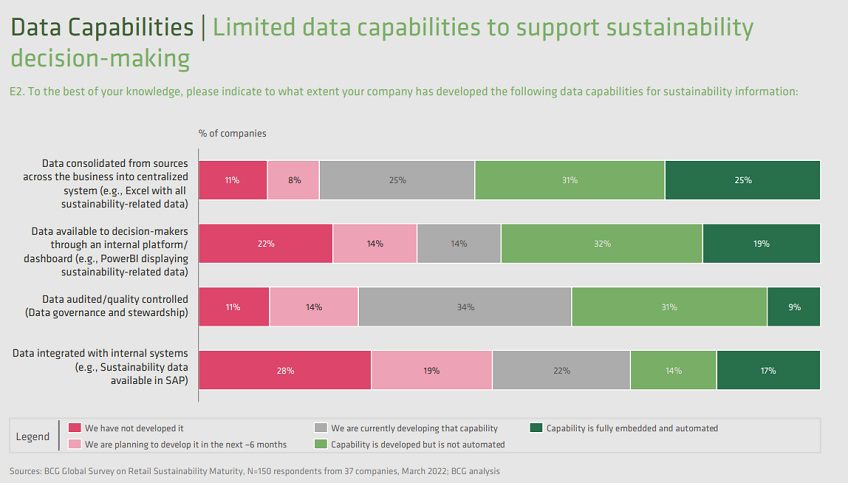A new maturity survey from BCG, developed in collaboration with the World Retail Congress, finds that sustainability is now a strategic priority for retail businesses. Some of the world’s largest retailers are making real headway in reducing the climate impact of their operations. That’s the good news. The more important finding from the survey, which polled employees at 37 major retail chains around the world, is that the sector as a whole has some way to go before it can claim truly green credentials.
Sustainability is a Priority
Around 70% of the survey respondents agree that sustainability is a priority for their boards and executive committees and that their leaders are sufficiently empowered to create the change required to meet their goals. The respondents are nearly unanimous in the belief that sustainability initiatives will drive value in the next 5-10 years (and about half believe their companies will invest “whatever it takes” to reach their stated goals). The retailers that align with that belief know that harnessing sustainability as a competitive advantage can unlock sources of value, reduce costs, grant access to new revenue pools, and reduce the cost of capital.
Gauged against performance across 12 key environmental targets, BCG finds almost 40% of respondents indicating that they are on track to meet scope 1 and 2 targets where retailers have the control and flexibility to implement changes.
 Biggest Hurdles: Embedding Sustainability, Achieving Data Transparency
Biggest Hurdles: Embedding Sustainability, Achieving Data Transparency
Nearly 50% of respondents say they do not believe that transformational change is needed to reach sustainability performance targets. And less than half believe that a scarcity of sustainable resources is a major challenge, despite forecasts of major shortfalls in terms of natural resources, carbon credits, and clean energy. The reality is that both transformational change and quick action will be required. Retailers will need to embed sustainability throughout the organization: involve cross-functional teams, create incentives, harness data, and engage suppliers to drive change.
- Organization and incentives: Few retailers have actually integrated sustainability into their operations, culture, and incentives. Most have yet to introduce sustainability performance drivers across their businesses. More than 50% have not set any sustainability KPIs beyond those that apply to the sustainability team, nor have they established sustainability metrics within their business planning.
- Data: Further exploration of the survey results revealed that one of the most cited challenges is a lack of access to relevant data (67%).
The Key Principles for Success
Sustainability, an Explicit Priority: Retailers must make sustainability an explicit priority. That means that leadership must not only sponsor the journey but be involved and accountable – all the time. The new prioritization must not be limited to setting bold goals and communicating them clearly.
Embed: With prioritization firmly in place, the next step is to strive for end-to-end integration. Embedding sustainability in the day-to-day business requires a review of the operating model and a shift in accountability. It requires critical changes in the ways that a company sets goals and applies incentives. Sustainability-related KPIs must be inculcated into all levels of the business. BCG’s survey finds that among the retailers that are performing well along the governance dimension, all are doing two things consistently: they are regularly publishing KPIs internally, and they are embedding sustainability metrics in their business reviews.
Re-imagine: Approximately 90% of the sustainability teams that BCG surveyed believe that engagement and collaboration with peers and other ecosystem members will be significant contributors to progress in sustainability. There are clear opportunities for retailers to work together to share solved problems. Closer interactions with suppliers will be essential too. More than 75% of retailers say that low commitment from suppliers on sustainability is an obstacle.
There are some retailers that have made demonstrable progress. Interviews suggest that they are truly generating value for their businesses, which can provide motivation for others in the sector. These companies have reported benefits in terms of reduced costs, being able to reach new customer segments, launching new businesses with innovative models, and attracting and retaining talent.
For example, one retailer that achieved the highest level of sustainability maturity recorded an increase in its sales of 6% in the past five years while recording that the average age of its customers decreased by 17 years. However, although progress is being made, it is crucial to acknowledge that many retailers are at the early stages of the maturity curve; to them, a large-scale transformation in sustainability may seem like a pipe dream. So the emphasis for those companies in the early stages should be to focus on small steps and quick wins.
Retailers can start by launching a few flagship programs focused on achieving sustainability targets. Additionally, sustainability teams can start to involve their broader organizations in sustainability conversations. It is especially important to begin regular dialog with the teams responsible for data and for IT.
Survey Methodology
BCG conducted a survey of employees at 37 global retailers, across five retailer types, with annual revenues ranging from $1 billion to ~$500 billion. The survey focused on four key areas in order to assess sustainability maturity:
- Perceptions within each organization
- Organizational preparedness: state of governance and data capabilities
- Perspective on starting point (baseline, targets, reporting)
- Collaboration: engagement with supplier networks and peer ecosystem
Maturity Was Assessed Based On Performance Along The Following Dimensions:
- Strategic positioning of sustainability
- Governance
- Capabilities
- Baseline
- Targets, progress, and value creation
- Reporting
- Ecosystem engagement
- Supplier engagement
 *Some of the companies which participated in the survey included: Aeon, BRC, Currys, Falabella, Kroger, Sephora, Shoprite, Worten, Woolworths. Others participated anonymously.
*Some of the companies which participated in the survey included: Aeon, BRC, Currys, Falabella, Kroger, Sephora, Shoprite, Worten, Woolworths. Others participated anonymously.









